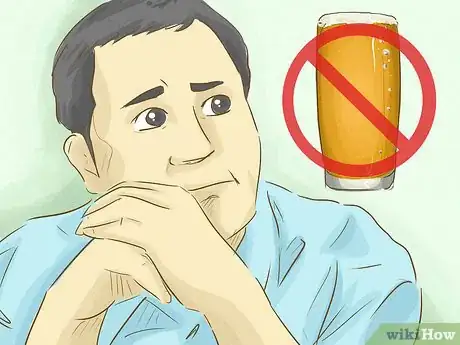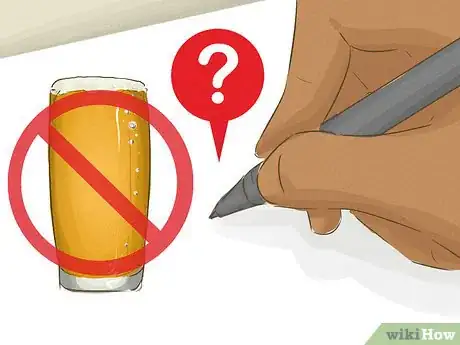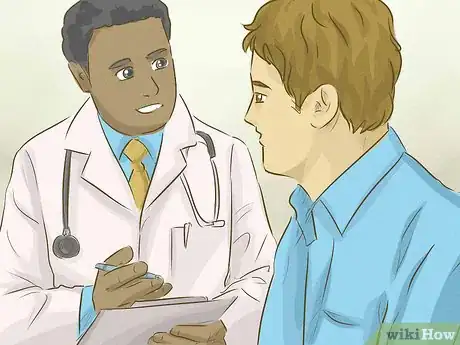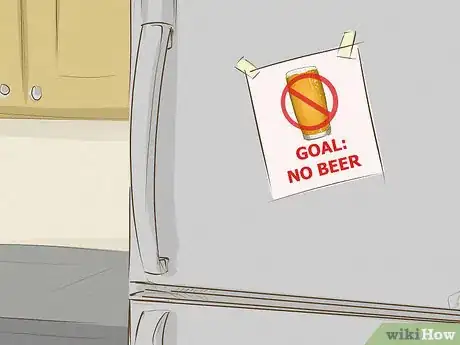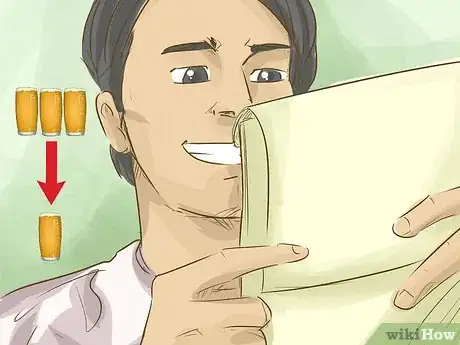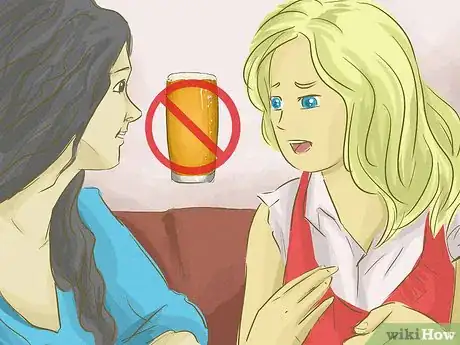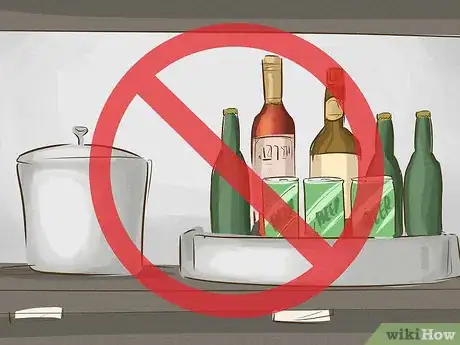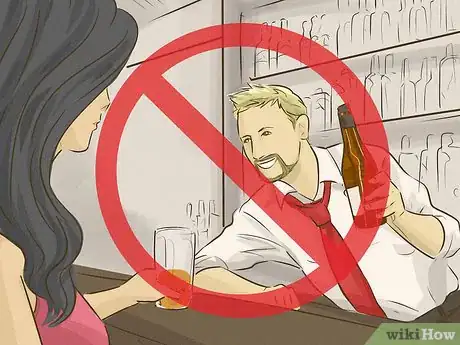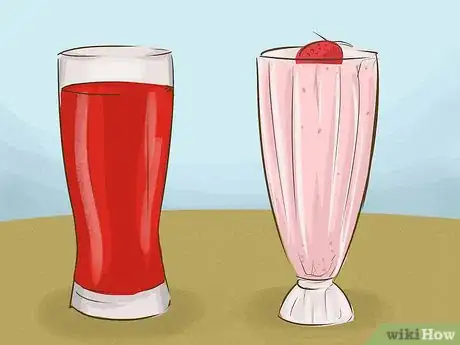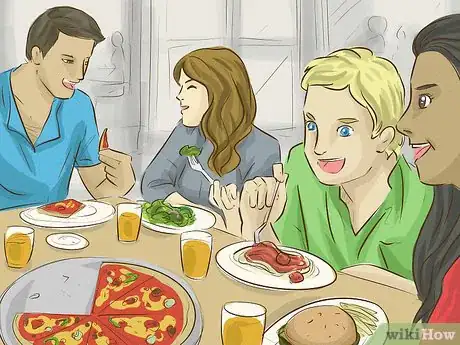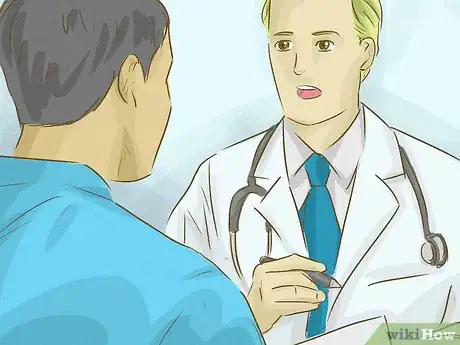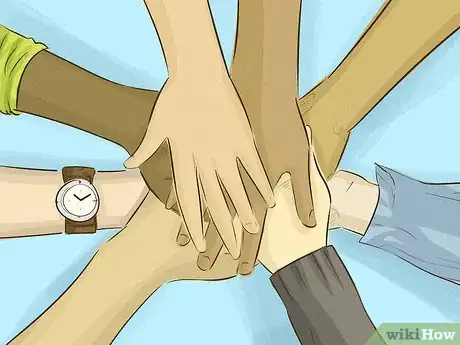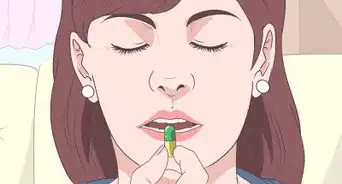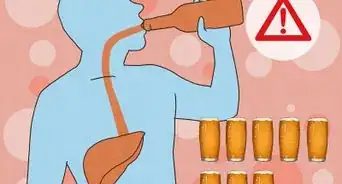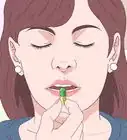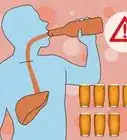This article was medically reviewed by Sarah Gehrke, RN, MS and by wikiHow staff writer, Megaera Lorenz, PhD. Sarah Gehrke is a Registered Nurse and Licensed Massage Therapist in Texas. Sarah has over 10 years of experience teaching and practicing phlebotomy and intravenous (IV) therapy using physical, psychological, and emotional support. She received her Massage Therapist License from the Amarillo Massage Therapy Institute in 2008 and a M.S. in Nursing from the University of Phoenix in 2013.
There are 9 references cited in this article, which can be found at the bottom of the page.
This article has been viewed 243,836 times.
Whatever your reasons are – to get healthier, save money, improve your personal relationships and work life, or just to see if you can – giving up beer may be a good choice for you. It’s difficult to give up anything you enjoy, and cutting out alcoholic beverages can be especially hard for some people. You can work towards your goal of giving up beer by making a plan, creating healthy habits that help you avoid the urge to drink, and getting the support you need to quit.
Steps
Making a Plan
-
1Decide why you want to stop drinking beer. While beer is okay for most people in moderation, it can cause a variety of problems if you drink too much of it. Long-term overuse of beer can lead to obesity, problems with the heart, liver, pancreas, and digestive tract, and neurological problems. When consumed by a pregnant or nursing mother, beer can be harmful to a fetus or breastfed baby. Excessive drinking can also impair your judgment, damage your relationships, and leave you feeling tired and sick.[1] If you are considering reducing or eliminating your beer consumption, you may find it helpful to identify some of the reasons you want to stop drinking beer.
- If you are concerned that drinking too much beer may be affecting your health, talk to your doctor about it. Your doctor may be able to give you a better idea about what sort of effect the alcohol you consume is having on your body.
- Consider whether the amount of beer you are drinking may be affecting your work or your relationships. Are you having arguments with your family, friends, or significant other(s) because of the amount of beer you drink? Are you often too tired to get work done because you had too much beer the night before?
-
2Make a list of the reasons you want to stop drinking. Once you have identified some of your reasons for wanting to stop drinking beer, you might find it helpful to write them down. You may wish to ask a supportive friend or family member to sit down with you and help you come up with your list.[2]Advertisement
-
3Talk to your doctor about the best way to quit. Depending on how much beer you drink and how dependent you are on beer, you may need to quit gradually rather than just stopping abruptly. Quitting cold turkey may result in potentially serious withdrawal symptoms. Your doctor can assess your overall health and help you come up with a plan that works best for you.[3]
- Depending on your health and how alcohol-dependent you are, your doctor may recommend quitting beer altogether, quitting for a specific period of time (e.g. 30 days), or simply reducing your beer intake.
- Bring up any questions and concerns you may have about how drinking beer is affecting your health.
-
4Write a plan and put it where you will see it. Once you have discussed a possible course of action with your doctor, write up the steps you intend to take to stop drinking beer. Make a few copies of the plan and post them around in places where you will see them every day, like on the door of your refrigerator or on your bathroom mirror.[4]
- Make a list of strategies that you will use to keep yourself on track, e.g. avoiding going to the bar with friends after work, getting all the beer out of your house, or filling your regular drinking time with some other activity.
- Include a list of possible obstacles to carrying out your plan, and strategies for dealing with these obstacles.
- If you have decided to scale back your use of beer gradually, include a timeframe for reducing your beer drinking in your plan (e.g., cut back to two glasses a day the first week, one glass per day in the second week, and so on).
-
5Keep track of your progress. Make note of any relapses, but also keep track of your successes. When the period of your plan ends, evaluate how you did and revise your plan if necessary. Then, keeping the things you learned in mind, try again.[5]
-
6Tell people you trust about your plan. Tell people that you know will be supportive. This may include family, close friends, or your doctor. They can help keep you accountable and take steps to support your efforts.[6]
Creating Strategies to Avoid Drinking Beer
-
1Get rid of beer in your home. If you have a fridge full of beer at home, chances are you will be tempted to drink it. Give away or throw out any beer that you still have in the house. Ask anyone else living with you or visiting you to respect your efforts by not bringing any more beer into your home.[7]
-
2Avoid tempting situations. If you find yourself too tempted to drink in certain places or situations – for example, at parties, sporting events, or bars – then avoid those situations if you can. If you are unable to avoid going somewhere where you know you’ll be tempted, make a plan to help yourself resist the urge to grab a beer.[8]
- Try asking a supportive friend to go with you as an accountability buddy.
- Step outside for a few moments if you find yourself too tempted to drink.
- If you have to, make an excuse to leave early.
-
3Practice meditation daily. Meditation can be very effective for managing alcohol addiction. In addition to reducing stress (a common underlying risk factor in alcoholism), regular meditation can help you achieve greater discipline and self-awareness, and can improve your physical health.[9] Set aside 15-20 minutes every day to sit in a quiet, comfortable place, away from distractions. Close your eyes and focus on your breathing.
- If it helps, repeat a meaningful phrase or mantra to yourself as you meditate.
- If you’re not sure how to start, take a meditation class at your local fitness center. Alternatively, look for guided meditation videos online.
-
4Spend time with supportive people. Hang out with friends and family who respect your desire to give up beer. If you know someone is going to offer you a beer, give you trouble about your decision not to drink, or tempt you by drinking in front of you, it may be best to avoid that person for awhile.[10]
-
5Stay active. You’ll be less tempted to drink beer if you’re keeping yourself busy doing other things. Use the time that you would otherwise spend drinking by doing something that you enjoy or working towards something you’d like to accomplish. Try picking up a new exercise routine, working on a creative project, or learning a new skill or hobby.[11]
-
6Refresh yourself with something else. If you feel tempted to drink beer, treat yourself to some other kind of refreshing treat or beverage. Try fruit juice, herbal tea, a sparkling beverage, or an electrolyte-rich sports drink. Alcohol-free beer is also an option, if you really crave the taste of beer but want to avoid the alcohol content. However, keep in mind that many “alcohol removed” beers do contain a very small amount of alcohol.
- Carbonated beverages, such as sparkling water with lime, lemon, ginger, or mint, can give you the same satisfying fizzy sensation that you get from beer.
- Fancy carbonated drinks can also help you mingle and feel less out of place in settings where others are drinking alcohol, since they superficially resemble many alcoholic drinks.
-
7Reward yourself for not drinking beer. If you reach a major goal (like 30 days without a drink of beer), treat yourself. Use the money that you saved by not buying beer to buy yourself a nice gift or have a fun (and beer-free) evening out.[12]
- Use an alcohol spending calculator like this one to figure out how much you’re saving by cutting back on beer: https://www.rethinkingdrinking.niaaa.nih.gov/tools/Calculators/alcohol-spending-calculator.aspx
Getting Support
-
1Talk to your doctor. If you’re having trouble giving up beer on your own, your doctor may be able to help. Set up an appointment with your primary care physician to talk about your concerns. They might be able to refer you to an addiction specialist or even prescribe a medication to help reduce your desire to drink.[13]
-
2Talk to a counselor. Mental health specialists, such as psychologists, psychiatrists, or licensed clinical social workers, can provide excellent resources for helping you quit drinking. Your counselor may suggest a support group, offer practical advice and strategies for quitting and staying on track, or simply be there to listen while you talk through any frustrations and anxieties you have surrounding your drinking habits.[14]
-
3Join a support group. Support groups can come in the form of group therapy (led by a trained counselor or addiction therapist) or peer-based support groups (like Alcoholics Anonymous and other 12-step programs). Support groups have the advantage of offering the support of peers who are going through the same things that you are.[15] Ask your doctor or therapist to refer you to good support groups in your area.
-
4Get help from friends and family. If you’re feeling discouraged or tempted to drink, it can help to reach out to someone who cares. Pick up the phone and call someone you trust, or schedule some quality time together to talk about what you’re going through or just hang out.[16]
Expert Q&A
Did you know you can get expert answers for this article?
Unlock expert answers by supporting wikiHow
-
QuestionI'm very sportive and focused, but I can't stop drinking beer. I drink almost every day, after work or even after cleaning the apartment. Aprox. 1.5lt. I'm female, and my father drank a lot. My brother also. What can I do?
 Sarah Gehrke, RN, MSSarah Gehrke is a Registered Nurse and Licensed Massage Therapist in Texas. Sarah has over 10 years of experience teaching and practicing phlebotomy and intravenous (IV) therapy using physical, psychological, and emotional support. She received her Massage Therapist License from the Amarillo Massage Therapy Institute in 2008 and a M.S. in Nursing from the University of Phoenix in 2013.
Sarah Gehrke, RN, MSSarah Gehrke is a Registered Nurse and Licensed Massage Therapist in Texas. Sarah has over 10 years of experience teaching and practicing phlebotomy and intravenous (IV) therapy using physical, psychological, and emotional support. She received her Massage Therapist License from the Amarillo Massage Therapy Institute in 2008 and a M.S. in Nursing from the University of Phoenix in 2013.
Registered Nurse You have figured out a couple of triggers for what causes you drink (work, cleaning). If there are other activities that trigger this as well, you can start to develop a list. Then, create a list of other activities you can do instead of drinking. Maybe start small--let's say, for example, on Monday, Wednesday, and Friday you reach for tea or sparkling water to relax (or, even just start with Monday!). Try a meditation practice after work. Break down your change into small increments so you have a "quick win" and you can start to see the results quicker. Leaning toward finding support or talking to someone you trust about your drinking as another good step to take.
You have figured out a couple of triggers for what causes you drink (work, cleaning). If there are other activities that trigger this as well, you can start to develop a list. Then, create a list of other activities you can do instead of drinking. Maybe start small--let's say, for example, on Monday, Wednesday, and Friday you reach for tea or sparkling water to relax (or, even just start with Monday!). Try a meditation practice after work. Break down your change into small increments so you have a "quick win" and you can start to see the results quicker. Leaning toward finding support or talking to someone you trust about your drinking as another good step to take. -
QuestionI know I need to completely stop drinking alcohol. In the past I tried to lower it, but always end up going back to the same and now more. Are there any herbal supplements you know of that could help with withdrawal symptoms?
 Sarah Gehrke, RN, MSSarah Gehrke is a Registered Nurse and Licensed Massage Therapist in Texas. Sarah has over 10 years of experience teaching and practicing phlebotomy and intravenous (IV) therapy using physical, psychological, and emotional support. She received her Massage Therapist License from the Amarillo Massage Therapy Institute in 2008 and a M.S. in Nursing from the University of Phoenix in 2013.
Sarah Gehrke, RN, MSSarah Gehrke is a Registered Nurse and Licensed Massage Therapist in Texas. Sarah has over 10 years of experience teaching and practicing phlebotomy and intravenous (IV) therapy using physical, psychological, and emotional support. She received her Massage Therapist License from the Amarillo Massage Therapy Institute in 2008 and a M.S. in Nursing from the University of Phoenix in 2013.
Registered Nurse Supporting your adrenals, liver, and gastrointestinal tract is a good place to start. B-vitamins, milk thistle, L-glutamine, Ashwagandha, 5-HTP, passion flower, Angelica Extract, and medicinal mushrooms, i.e., reishi and cordecyps. These will help support your body as you go through withdrawal. Depending on how much you drink, you may consider having a friend in the house with you when you decide to stop drinking.
Supporting your adrenals, liver, and gastrointestinal tract is a good place to start. B-vitamins, milk thistle, L-glutamine, Ashwagandha, 5-HTP, passion flower, Angelica Extract, and medicinal mushrooms, i.e., reishi and cordecyps. These will help support your body as you go through withdrawal. Depending on how much you drink, you may consider having a friend in the house with you when you decide to stop drinking.
References
- ↑ https://www.niaaa.nih.gov/alcohol-health/overview-alcohol-consumption
- ↑ http://www.webmd.com/mental-health/addiction/how-to-stop-drinking-alcohol
- ↑ https://pubs.niaaa.nih.gov/publications/Treatment/treatment.htm
- ↑ https://www.rethinkingdrinking.niaaa.nih.gov/Thinking-about-a-change/Its-up-to-you/Planning-For-Change.aspx
- ↑ https://www.rethinkingdrinking.niaaa.nih.gov/Thinking-about-a-change/Its-up-to-you/Planning-For-Change.aspx
- ↑ http://www.webmd.com/mental-health/addiction/how-to-stop-drinking-alcohol
- ↑ http://www.webmd.com/mental-health/addiction/tc/ideas-to-help-you-cut-back-on-or-stop-using-alcohol-topic-overview
- ↑ https://www.rethinkingdrinking.niaaa.nih.gov/Thinking-about-a-change/Strategies-for-cutting-down/Tips-To-Try.aspx
- ↑ https://tmhome.com/benefits/alcohol-abuse-alternative-quit-meditation/
- ↑ http://www.webmd.com/mental-health/addiction/tc/ideas-to-help-you-cut-back-on-or-stop-using-alcohol-topic-overview
- ↑ https://www.rethinkingdrinking.niaaa.nih.gov/Thinking-about-a-change/Strategies-for-cutting-down/Tips-To-Try.aspx
- ↑ http://www.webmd.com/mental-health/addiction/how-to-stop-drinking-alcohol
- ↑ https://pubs.niaaa.nih.gov/publications/Treatment/treatment.htm
- ↑ https://pubs.niaaa.nih.gov/publications/Treatment/treatment.htm
- ↑ https://www.collegedrinkingprevention.gov/SpecialFeatures/gettinghelp.aspx
- ↑ http://www.webmd.com/mental-health/addiction/tc/ideas-to-help-you-cut-back-on-or-stop-using-alcohol-topic-overview
- ↑ https://pubs.niaaa.nih.gov/publications/aa41.htm
About This Article
To stop drinking beer, start by giving or throwing away any beer in your house and avoiding tempting situations such as bars. Then, try replacing beer with nonalcoholic carbonated drinks, like sparkling water or fruit juices mixed with seltzer. You can also reward yourself by saving the money you would spend on beer and, at the end of a month, buying yourself a present or taking yourself out for a nice meal. Finally, one of the best ways to stay accountable is to tell friends or family about your goal to not drink beer. To learn how to get support from a therapist or group, keep reading!
